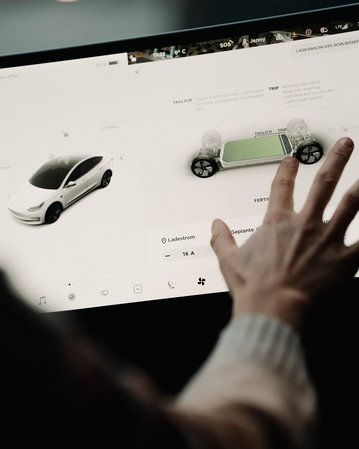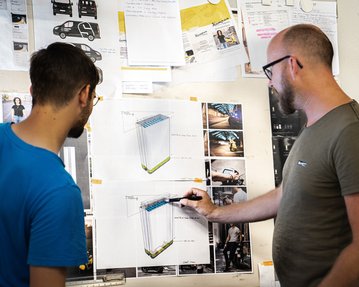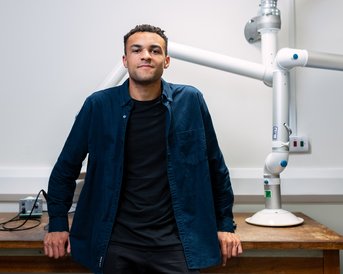Energy storage, electric cars and ethics. Gain a thorough understanding of battery production! Our dual engineering Master's combines production engineering, battery technology as well as sustainability management and strengthens your soft skills.
Sustainable Battery Production Engineering | DUAL
- Master of Engineering (M.Eng.)
- 4 Semesters
- Practical study
- 120 ECTS
- Partner company usually pays the tuition fees
- New
- Dual
- English
- Intake: October 2024 | German skills required

Battery Development, Environmental Protection...
The storage of sustainably generated energy is becoming more and more important. Batteries are not only relevant for the use in electric vehicles but also for stationary applications. In order to push the energy revolution forward, a new generation of experts is needed who understand the technological and business aspects of battery production and are able to put these topics into the overall industrial and social context.
Our M.Eng. Sustainable Battery Production Engineering provides you with both technical expertise in battery technology and production engineering as well as knowledge of management basics.
In the Master's programme, you learn more about the technological principles of battery systems and battery production techniques and current technologies such as automation, robotics and mechatronics. You gain an understanding of measurement technology, quality assurance, data analysis and recycling technologies and study and work hands-on thanks to the integrated lab and team work activities.
Modules on product lifecycle management, risk and project management and innovative business models are part of the curriculum as are digital signal processing, artificial intelligence, cloud technologies and virtual reality.
In addition, you get to view economic and technical systems not just from an individual but a comprehensive perspective and learn to always make decisions taking sustainability into consideration.
The topics circular economy and sustainable development are therefore guiding principles that help you take ecological, social and ethical challenges that are associated with battery production into account. This way you do not only extend your expertise but also get to further develop your personality.
Thanks to the skill- and project-focused approach, you are able to strengthen your analytical, communicative, social and intercultural skills in projects and during your work in your partner company. The dual concept also helps you not only to gain better insights into everyday working life and its challenges, you also build up a network, become an integral part of the partner company and thus increase your career prospects.
In addition, you will have the opportunity to obtain the following extracurricular certificates:
- Siemens Mechatronic Systems Certificate Program (SMSCP) at level 1-2
- Battery Technician (European Battery Alliance & EIT-InnovEnergy)

Innovation manager, Engineering positions and more
The increasing demand for electric vehicles and energy storage systems for private and commercial use also creates an increased need for new battery technologies and a growing global battery production.
As a graduate of the Master of Engineering in Sustainable Battery Production Engineering, you have learned to view battery production from different angles. Apart from using only your technical and business knowledge, you also consider social and environmental factors when performing analyses and making business decisions
The work assignments in your partner company, study projects, laboratory work and innovative academic formats will help you train your technical and soft skills and increase your network and employability.
After completing your Master's degree in battery technology, you will be a sought-after generalist that can start a career in various areas of battery production, in today's and tomorrow's automotive industry and its suppliers but also in the public sector or in consulting.
Career opportunities lie in the following industries and areas:
- Automotive industry
- Automotive suppliers
- Manufacturers of other battery types (e.g. stationary applications)
- Recycling solutions for batteries
- Consulting and training in battery production
- Digital industrial and service applications
Graduates of the Engineering Master's are able to apply for positions such as:
- Innovation manager
- Product manager
- Project manager
- Process Engineer
- Consultant
- Expert and Engineering positions
- and many more
The internationally-recognised Master of Engineering degree also qualifies students to pursue a doctorate.


What is a dual study programme?
A dual study programme combines an academic education with relevant work experience. Even though a lot of full-time programmes offer work experience as well, e.g. as internships, dual programmes contain more practical periods. Students work a certain amount of hours per week in a partner company while joining lectures during the remaining time. This way they get to apply the newly-acquired knowledge straight away and become an integral part of the partner company. As most companies also either pay a training salary or pay the tuition fees, students benefit from a higher degree of financial security.

Study programme brochure and more ...

Our study concept
Your studies are divided into 5-week blocks. During this time you can focus on one engineering or management topic which you get to view from different angles. Thanks to this approach you can learn about real world challenges and strengthen the skills that employers are looking for.
Your Curriculum
-
Fundamentals of Batteries
5 -
Tools & Methods of Data Analysis
5 -
Advanced Data Processing for Artificial Intelligence
5 -
Digital Signal Processing, Sensors and Cloud Technologies
5 -
Company Work I
10
-
New Industrial Technologies
5 -
Production Engineering I
5 -
Measurement Techniques I
5 -
Company Work II
15
-
Sustainability and Product Lifecycle Management
5 -
Production Engineering II
5 -
Measurement Techniques II
5 -
Company Work III
15
-
Master's Thesis and Defence
30
We help you achieve your goals
Our requirements
To submit your application, you will need the following:
- Bachelor of Science or Bachelor of Engineering in Production/Manufacturing Engineering, Material Science, Chemical Engineering, Electrical Engineering or similar. If you do not have the degree certificate yet, you can also submit it before you start your studies.
- Proof of English language proficiency
- Proof of German language skills (required by the partner companies in Germany)
- Letter of motivation
- Secondary School Certificate
- Curriculum vitae
- Copy of your passport/ID
- IMPORTANT: You will need a partner company before you start your studies
You do not qualify for direct entry? Join our preparatory course and get qualified to start your Master’s degree at SRH.
Next available course
Here are our English language requirements:
- TOEFL 87 ibt (direct entry)
- TOEFL 79 - 86 ibt (with additional agreement)
- TOEIC 785 (Listening/Reading 785, Speaking 160, Writing 150)
- IELTS (academic) 6.5 on average - please see Language Centre guidelines if results differ
- CAE (grade A, B, or C)
- CPE (grade A, B or C)
- Pearson English Test Academic (PTE-A) 59 points
- Linguaskill: 176 - 184 (CES) - all four skills required
- Duolingo 110 points
Please also submit proof of your German language skills.

Application process and deadlines
Please find the Application and Late Arrival deadlines here.
We are happy to welcome you to our university. This is our application process:
- You submit your online application via the SRH application portal
- If you meet the admission requirements, we will invite you to a personal/phone interview
- If the interview is successful, you will receive an acceptance letter and the study contract
- You sign the study contract and send it back to us
- You pay the enrolment fee
- You receive your letter of admission
- You take part in our Welcome Week and then you are good to go!
Join our 3 different webinar series
- How do I apply? series
- How do I finance my studies? series
- Q&A with your study advisor series




